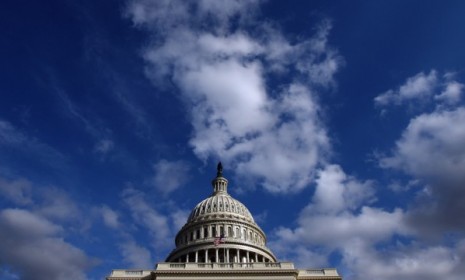America's big shift to the right: Fact or fiction?
Democratic strategist Ruy Teixeira says the American electorate actually hasn't changed much. Others challenge his definitions of "electorate" and "much"

A free daily email with the biggest news stories of the day – and the best features from TheWeek.com
You are now subscribed
Your newsletter sign-up was successful
The 2010 fight for control of Congress is over, but the battle to interpret the results wages on. And "the big dispute at the heart of most arguments," says Ed Kilgore in The Democratic Strategist, is "whether the U.S. electorate is moving ideologically to the right in a way that gives Republicans a natural majority in the future." The conventional wisdom, based on the GOP gains and exit polls, is "yes." But is the conventional wisdom right?
Conservatives, not America, moved right: There has been a slight shift to the right since 2006, says Ruy Teixeira in The Democratic Strategist (PDF), but it's "overwhelmingly an intra-Republican story." More Republicans and GOP-leaning independents, who "act very similar to Republican partisans," now call themselves conservative, and they "turned out at very high levels in 2010." The rest of the country? It's stayed largely the same.
"Is the electorate moving to the right? Ruy Teixeira says no"
The Week
Escape your echo chamber. Get the facts behind the news, plus analysis from multiple perspectives.

Sign up for The Week's Free Newsletters
From our morning news briefing to a weekly Good News Newsletter, get the best of The Week delivered directly to your inbox.
From our morning news briefing to a weekly Good News Newsletter, get the best of The Week delivered directly to your inbox.
Still, the trend should worry Dems: However big or small the shift, says Jay Cost in The Weekly Standard, the overall trend should be small comfort for Democrats, who are doomed by the electoral map. "Nowadays the Democrats win the cities, but are much weaker everywhere else," and the increasingly conservative South is just gaining more power and seats in Congress.
"Is the electorate moving right?"
It's the Democratic politicians who have shifted: Liberals weren't motivated to vote this year, says Stephanie Taylor in U.S. News, because their candidates failed to fight "for popular progressive change." Most Americans believe in Big Government programs like Social Security and wanted a public option for health care. In other words, "we live in a center-left country," but that "isn't reflected in our government or in the timid, conservative elements of the Democratic Party."
"Democrats... didn't fight for popular progressive policies"
A free daily email with the biggest news stories of the day – and the best features from TheWeek.com
-
 ‘Those rights don’t exist to protect criminals’
‘Those rights don’t exist to protect criminals’Instant Opinion Opinion, comment and editorials of the day
-
 Key Bangladesh election returns old guard to power
Key Bangladesh election returns old guard to powerSpeed Read The Bangladesh Nationalist Party claimed a decisive victory
-
 Judge blocks Hegseth from punishing Kelly over video
Judge blocks Hegseth from punishing Kelly over videoSpeed Read Defense Secretary Pete Hegseth pushed for the senator to be demoted over a video in which he reminds military officials they should refuse illegal orders
-
 The billionaires’ wealth tax: a catastrophe for California?
The billionaires’ wealth tax: a catastrophe for California?Talking Point Peter Thiel and Larry Page preparing to change state residency
-
 Bari Weiss’ ‘60 Minutes’ scandal is about more than one report
Bari Weiss’ ‘60 Minutes’ scandal is about more than one reportIN THE SPOTLIGHT By blocking an approved segment on a controversial prison holding US deportees in El Salvador, the editor-in-chief of CBS News has become the main story
-
 Has Zohran Mamdani shown the Democrats how to win again?
Has Zohran Mamdani shown the Democrats how to win again?Today’s Big Question New York City mayoral election touted as victory for left-wing populists but moderate centrist wins elsewhere present more complex path for Democratic Party
-
 Millions turn out for anti-Trump ‘No Kings’ rallies
Millions turn out for anti-Trump ‘No Kings’ ralliesSpeed Read An estimated 7 million people participated, 2 million more than at the first ‘No Kings’ protest in June
-
 Ghislaine Maxwell: angling for a Trump pardon
Ghislaine Maxwell: angling for a Trump pardonTalking Point Convicted sex trafficker's testimony could shed new light on president's links to Jeffrey Epstein
-
 The last words and final moments of 40 presidents
The last words and final moments of 40 presidentsThe Explainer Some are eloquent quotes worthy of the holders of the highest office in the nation, and others... aren't
-
 The JFK files: the truth at last?
The JFK files: the truth at last?In The Spotlight More than 64,000 previously classified documents relating the 1963 assassination of John F. Kennedy have been released by the Trump administration
-
 'Seriously, not literally': how should the world take Donald Trump?
'Seriously, not literally': how should the world take Donald Trump?Today's big question White House rhetoric and reality look likely to become increasingly blurred